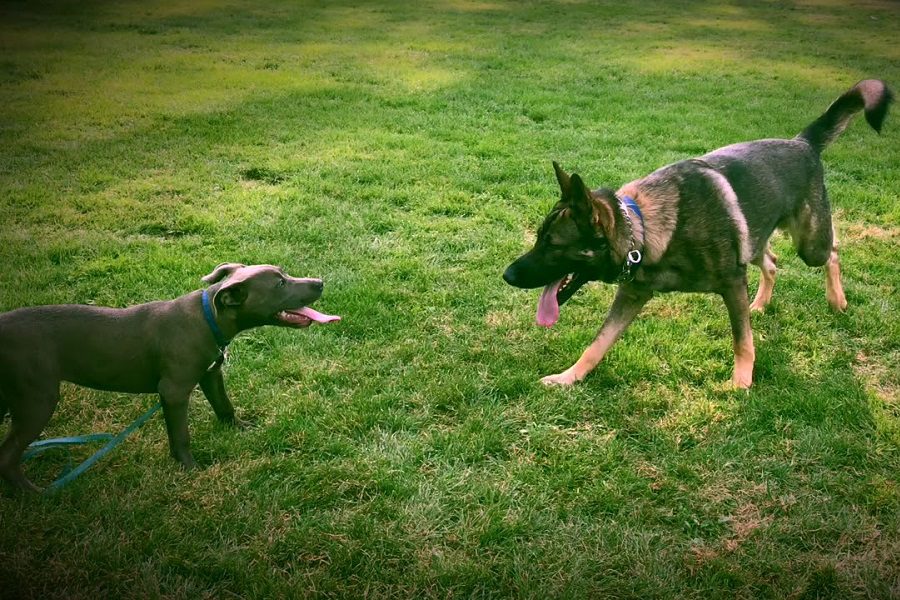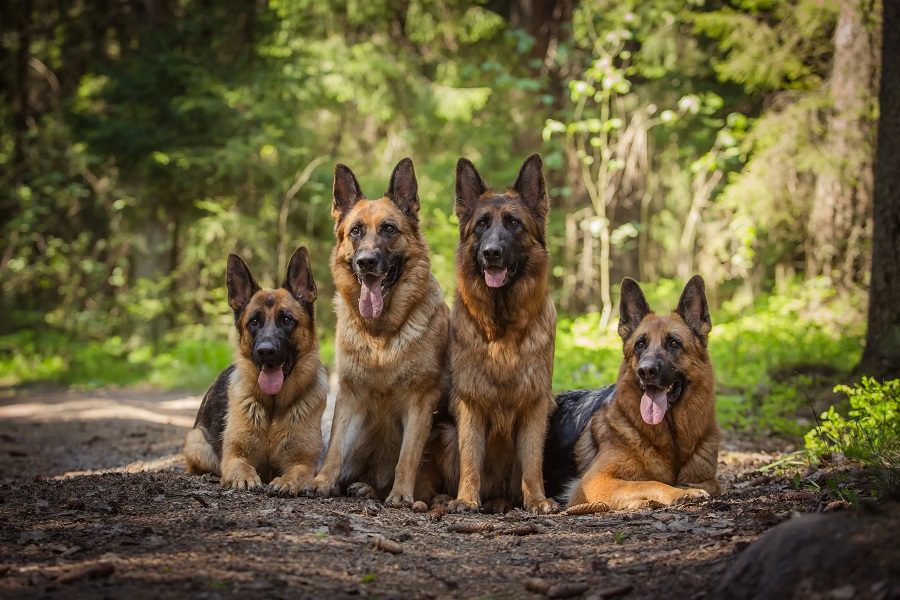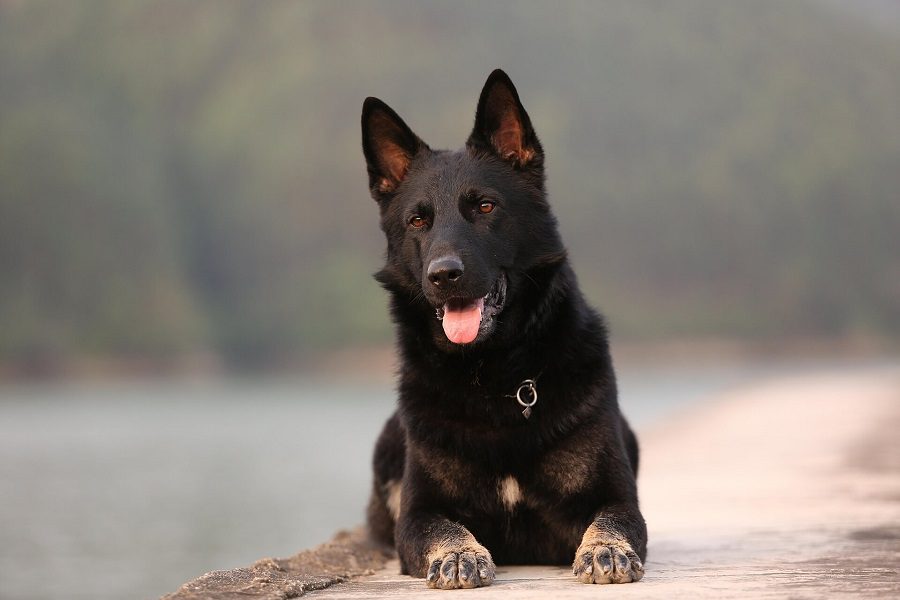Last Updated: 2 years ago
Fleas are a major annoyance that can seriously affect your dog’s health if left untreated.
They can also bother you, even though they don’t target humans. And the longer a flea infestation is left untreated, the worse it will get.
So whether you already know your dog has fleas, you just suspect it, or you just want to be prepared in the future in case it happens, read this article to make sure you are ready to handle your German Shepherd’s flea problem quickly and effectively.
In this article, we’ll talk about the various symptoms of fleas and the health side effects that can harm your German Shepherd. Then we’ll talk about how to identify if your dog has fleas and how far along the infestation is.
After learning about fleas in general, we’ll look at some of the best ways to treat them, including both home remedies and store-bought flea medication reviews. Finally, you’ll get some tips for how to prevent fleas from taking over your dog and your home in the future.
Symptoms And Side Effects Of Fleas
Fortunately, a flea infestation is easy to identify accurately (unlike, say, the flu or parvo) because you just have to look for critters in your pup’s fur. That said, German Shepherds have thick coats, so a flea infestation can be hidden until it becomes serious.
That means you need to make an effort to thoroughly check your dog’s fur regularly—as in weekly.
Aside from actually seeing fleas on your dog, check for other symptoms like:
- Frequent scratching, chewing, licking, or rubbing
- Unusually excessive hair loss and patchy fur
- Sores or red, raw skin
- Tapeworms in the stool or around the dog’s anus (they will look like grains of rice).
Treating flea infestations is important. It’s not just annoying. It can actually lead to other, more serious health problems, like:
- Bacterial infections: the open wounds from flea bites and your dog’s constant chewing and scratching put your pup at risk for bacteria getting inside those wounds. This can lead to infections on the skin and internally.
- Tapeworms: fleas host tapeworms, and as your dog chews, they will likely end up swallowing a few fleas that host tapeworms.
- Anaemia: this is a low red blood cell count, which is the result of too many flea bites draining too much blood from your poor pup.
- Neurogenic Dermatitis: This is a behavioural problem in which your dog obsessively chews and licks, causing chronic skin problems.
How To Recognize A Flea Problem
Recognising a flea problem is the first step to taking care of it. You should be checking your pup regularly for fleas, especially if it likes to play outdoors. Use the following 3 stages as a rough guide to figuring out how bad the problem is and what kind of treatments you should be using:
Stage 1
This is the early stage. You’ll notice a few adult fleas, but they won’t be very widespread. That doesn’t mean you can ignore it. They reproduce and populate quickly. Catching it at this stage means you’ll be able to treat the problem more quickly, and you don’t have to resort to maximum-strength products. Shampoos and gentle sprays can probably handle it.
You should also practice the prevention measures to make sure you attack the source of the fleas so that the problem doesn’t keep recurring.
Stage 2
By stage two, the fleas are more widespread on your dog, and there are most likely some eggs or larvae in your carpeting and upholstery, but they still aren’t all over and are not biting you (unless you are near the dog).
You can nip this in the bud by using a stronger medication or treatment and practicing the preventative measures discussed at the end of this article.
Stage 3
This is the most advanced stage. Fleas are everywhere. They’re biting the dog. They’re biting you. Your German Shepherd is probably losing fur and is in a lot of distress. At this point, you need the strongest treatment possible. We recommend getting store-bought products rather than using home remedies (or using those products in combination with home remedies).
However, do be careful. If your dog’s skin is scabbed over and covered in scratch and bite marks, you should use an internal medication (like tablets) rather than a spray or anything that is applied directly to the skin.
Home Remedies for Getting Rid of Fleas
Here are a few home remedies that can help treat a flea problem. As standalone treatments, they’re effective for the early stages of flea infestation. You’ll want to opt for medical-grade treatments for serious infestations.
- Citrus: rub orange or lemon juice on your dog’s coat. Fleas (and mosquitoes, actually) are repelled by the strong, acidic citrus odor. And your dog will smell lemon-fresh!
- Bath: a refreshing swim in the pool or in the bathtub is a great defense. Fleas can’t cling to skin or hair, so they will be washed away with the current of the water. Submerge the dog fully. Or, if they won’t put their head under, manually remove the fleas that congregate on top of their heads to escape the waters.
- Predators: You can buy beneficial insects (certain nematodes and worms) for your yard that feed on fleas and their eggs. This can help minimise the risk of repeated infestations.
- Essential oils: massage rose geranium oil into your German Shepherd’s coat. Like citrus, this essential oil repels fleas and ticks. (A special side note: you shouldn’t do this with a cat or a dog that licks themselves a lot, as they can end up ingesting a toxic amount of the essential oil.)
Top 5 Flea Treatments on the Market
Here are our top 5 picks for treating the flea problem in your home on every battleground (from your dog to your furniture):
Natural Chemistry Upholstery The Flea Trigger
This is a spray for your couches, carpet, and anywhere else your dog might lie down. Since fleas are jumpers, they tend to get into carpeting and upholstery, where they lie in wait for a victim.
So you can use this spray to get rid of any stray fleas around your house so that they don’t spread to your other pets or re-infest your German Shepherd after you’ve treated it.
With that said, it’s not a standalone treatment. You won’t get rid of the fleas on your German Shepherd, just the ones that jump off of him. And while this is definitely important, it’s not enough to totally clear up the flea problem.
So we highly recommend this product, but we recommend using it in combination with a medication that you give to your dog or a flea shampoo. Read more about those below.
Adams Plus Flea And Tick Spray For Cats And Dogs
This spray is a pretty fantastic all-purpose spray. It works on cats and dogs. It kills fleas at every stage of their life cycle (egg, larvae, adult). It also kills ticks and repels mosquitoes. Basically, if there are critters trying to bite your pets, this spray has you covered.
It is fast-acting for immediate relief from the itchy flea bites. And it’s easy to use. You just spray your pet’s fur.
However, it is better used as a preventative treatment or an early-stage treatment because if your pup’s skin is scabbed over and has open wounds from flea bites and scratching, you don’t want the chemicals to get into the bloodstream.
Also, the recommended dose is pretty high. Go ahead and use less (enough to lightly coat all the fur) and gradually increase the amount if it doesn’t seem to be working. This is especially true for your younger puppies. Use less than recommended for young or small pets.
Novartis Capstar Flea Tablets For Dogs And Cats
This is a highly effective flea medication that will start killing off fleas within just 4 hours. It’s designed for smaller dogs, so it’s not too strong if your German Shepherd is still a pup.
The pack comes with six tablets, and each one is highly effective. We recommend using the full course of treatment to make sure you totally eliminate the problem.
The biggest drawback here is that it does come in tablet form, which means you need to get your dog to swallow the medicine. You can do this by wrapping it in a piece of meat or another treat. But this can still be a struggle with stubborn dogs.
So if your dog is stubborn about taking medicine, try the treatment option below, which is applied directly to the fur. However, if you know your dog can take pills, this is a highly effective treatment that is safe enough for smaller pups, so you can give it to your German Shepherd puppy.
Merial Frontline Plus Flea And Tick Control
This is a fantastic flea medication that’s perfect for larger breeds, like your German Shepherd. In just three doses, it can effectively eliminate an infestation. It kills flea eggs, fleas, and even ticks.
When you’ve got a late-stage problem and you need to kill a lot of fleas really fast, this is the treatment to get.
A word of caution: this should not be used on young puppies or smaller dogs. It’s very strong, heavy-duty stuff. So if your German Shepherd is younger than 8 weeks, you should use something gentler.
However, for dogs 8 weeks and up (and weighing at least 45 pounds), this is a highly effective and thorough treatment that is easy to apply and acts fast.
Oster Oatmeal Naturals Flea And Tick Shampoo
This is a wonderfully soothing shampoo for your German Shepherd. It’s a natural recipe without any additives, so you get the gentleness and safety of a natural home remedy but the powerful and effective results of flea medication.
It’s also a great price and can be used in combination with other flea treatments since it will not wash away the medication you apply. It’s designed to attack fleas at every stage of the life cycle, while the oatmeal provides soothing nutrients for the skin.
However, it’s best for the early stages of flea infestations since it’s not as strong as some of the applications you can find. So if you’ve got a light infestation you are trying to deal with, this is great, but if the problem is really bad, you’ll want something stronger.
Preventing Future Outbreaks
The best way to deal with fleas is to stop them before they become a problem. Here are some tips for minimising the risk of a flea infestation on your German Shepherd and in your home:
- Groom your yard: a mowed and trimmed yard makes your house more appealing to humans and less appealing to fleas and ticks, who like overgrown plants where they can hide. You should also keep pet food bowls inside to prevent stray and wild animals from coming into your yard and leaving their fleas behind.
- Groom your dog: regular grooming keeps your pet’s coat shiny, healthy, and flea-free. Just as they like overgrown plants, they also like tangled, dirty fur where they can hide undisturbed. The thick coats of German Shepherds are especially attractive real estate for fleas if they are not groomed regularly.
- Bathe your dog: while you shouldn’t bathe your dog too often, you also shouldn’t skip it altogether. How frequently you bathe your dog depends on how dirty they get, but as a general rule, once every 1-2 months is a safe amount that won’t damage their skin and will keep any flea infestations at bay.
- Check for fleas regularly; you can do this while grooming. Use a flea comb to see if there’s any critter hiding in their fur before you start with your normal brushing.
- Get summer trims: as mentioned, the thick, luscious coat of a German Shepherd can be a haven for fleas. Consider shaving or at least shortening their coat during the summer months to keep them cool and make it easier to spot early signs of fleas.
- Vacuum: vacuum carpeting and upholstery at least once a week to pull out any eggs or larvae nesting in the fibres and waiting to pounce on your pup. If you currently have a flea problem, vacuum daily. And in either case, make sure you get into corners and along the edges where fleas will congregate to avoid high-traffic areas.
With these tips and treatments, you’ll be able to handle any flea problem, no matter how bad it gets. More importantly, you’ll be able to stop a flea infestation before it becomes a serious problem. This will keep both you and your German Shepherd happy.



